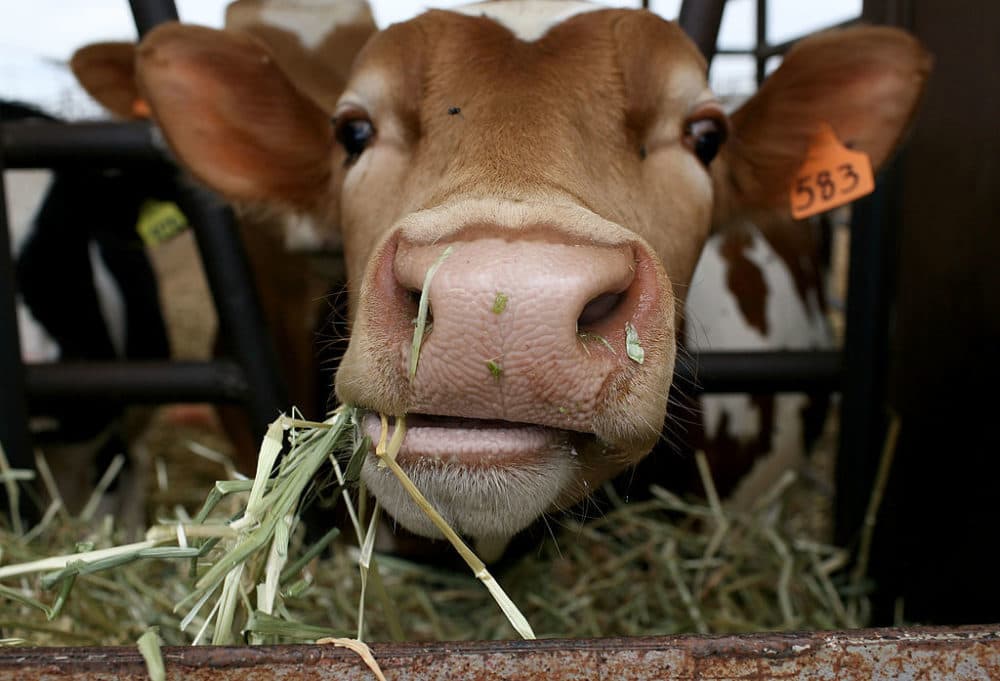Advertisement
Commentary
Can't Meat Eaters And Vegetarians Just Get Along?

I cried unashamedly a couple of weeks ago when one of our cats had to be euthanized. An insidious blood clot and congestive heart failure left Snowball’s hind legs useless and pronounced his death sentence; still, he crawled over to me on the vet’s couch and rubbed against my leg, rolling on his back to be petted as if this were like any other day during the last 11 years. I watched him go — a first injection to sedate him, then a second to stop his heart — stroking his fur and weeping out words of love in his final moments.
As powerful as is our bond with cats and dogs, it comes with walls that other species can’t scale. Most people with pets savor cows and pigs as food, even though both are sentient, the latter possessing intelligence superior to feline and canine. Meanwhile, both cows and pigs suffer legalized animal cruelty on factory farms. We tolerate this partly because the plight of our dinner is invisible to us, and partly because, to the typical pet-owning meat eater, “one is a friend and one is bacon.”
That meme dodges the moral question of why it’s OK to kill equivalently evolved creatures. But it captures the distinction most people make, Fordham food researcher Garrett Broad says, between companion animals and those they believe were “made to be meat.” Therein lies the explanation for several recent headlines: the backlash against Epicurious’s banishing of new meat recipes from its foodie website as a statement against climate change, and the unfounded, partisan-stoked panic that President Joe Biden schemes to denude upcoming summer barbeques of hamburgers.
Wade through the noise and it becomes clear that meat-eaters and vegetarians like me must compromise. Yes, eating less meat is a potent tool for curbing greenhouse gas emissions. But if we shift to sustainable, more responsible animal husbandry, then giving up meat completely (morality and healthiness aside) isn’t necessary to save the planet.
This half a loaf (pardon the vegetarian metaphor) is the byproduct of inconvenient facts for both camps. Carnivores must grant the link between sizzling meat and our sizzling planet. It wasn’t a vegan buyout of Epicurious that banned new meat recipes, but rather the owners’ recognition that, among U.S. sources of greenhouse gas emissions, agriculture accounts for 10% , and almost two thirds of that owe to “bovine belching” en route to our plates.
[I]f we shift to sustainable, more responsible animal husbandry, then giving up meat completely ... isn’t necessary to save the planet.
One carnivorous columnist’s rejoinder --”Canceling beef recipes won’t make a dent in climate change,” which requires legislative redress — missed the point. Epicurious’s goal was to fire a flare about the link between raising livestock and warming temperatures. The hope is that once enlightened, the public is likelier to advocate for necessary legislative action, and perhaps to eat less meat, which can dent climate change.
(The site’s editors aren’t alone; some restaurants are also making similar changes. Take, for example, the menu at Eleven Madison Park — New York’s raved-about-and-imitated eatery for those who can drop $335 on dinner — which is getting a vegan makeover in the name of sustainability.)
That carnivore columnist also dismissed new and improved vegan burgers, demanding we “dispense with the fiction that ‘meat’ can be plant-based.” If he’s making a definitional point, fine. If he means that plant-burgers can’t satisfy meat eaters’ taste buds, Burger King and others whose livelihoods hinge on meeting the market could enlighten him about growing plant-based burger demand.
Another critic asks if Epicurious will drop recipes involving dairy products, which also require cows. There again, the market is embracing non-dairy milk, while vegan cheese is getting a long overdue ingredient: tastiness.
But these welcome developments point to the compromise we in the non-meat camp must accept. Plant-based food’s popular acceptance is matched by the lightning rush of planet-preserving renewable energy. Wind and solar technology has fallen in cost by 70% and 89%, respectively, in the last dozen years, economist Paul Krugman notes. The sum of green energy and food options? Reducing rather than abolishing meat eating, combined with sustainably raised livestock, can help to avert climate disaster.
Dropping demand for meat would add economic force to the ethical argument for reforming the animal torture chambers we euphemize as “factory farms.” As a vegetarian, I’d welcome a vegetarian world in which all farm animals were cherished in the same way my family cherished Snowball. But as a realist, I’m aware of meat’s global cult. (From France to Britain to Denmark, even limited meatless menus in schools and state canteens have triggered growers, workers, parents and right-wing cranks into national protests.)
Carnism that’s bound by the ethical cultivation of meat and the practical imperative of the planet’s survival should be the modus vivendi of meat eaters and vegetarians. The worldview that puts animal friends and bacon in separate mental boxes isn’t going away. In 2015, one-third of Gallup respondents favored full human rights for other animals, while withholding a critical one: the right not to be the daily special on the menu. That one-third was overwhelmingly meat-eaters.
